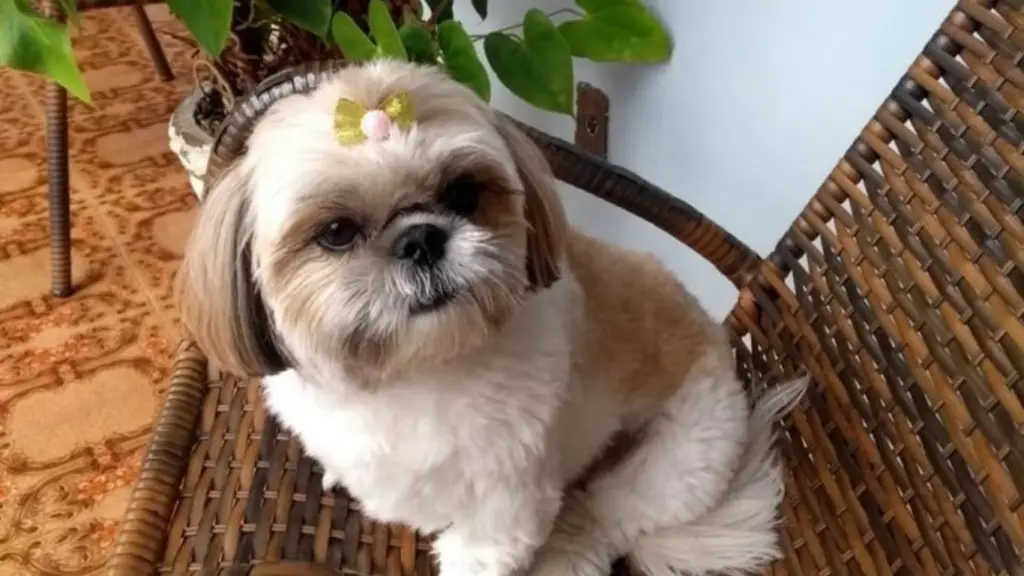
Bringing home a Shih Tzu puppy is an exciting and heartwarming experience. These adorable little dogs are known for their friendly nature, cute appearance, and playful personality. However, the first week with your new Shih Tzu puppy is crucial as it sets the foundation for your puppy’s future behavior and well-being. This guide will walk you through everything you need to know to make the first week with your Shih Tzu puppy a success.
Preparing Your Home Before Your Puppy Arrives

Before your Shih Tzu puppy arrives, it’s essential to ensure that your home is ready to welcome them. Puppy-proofing your home is the first step. Just like baby-proofing, this involves securing any potential hazards that your curious puppy might get into. Electrical cords, small objects, and toxic plants should be out of reach. Setting up a safe space for your puppy is also important. This could be a small room or a crate where your puppy can feel secure. It’s a place where they can retreat when they feel overwhelmed or tired.
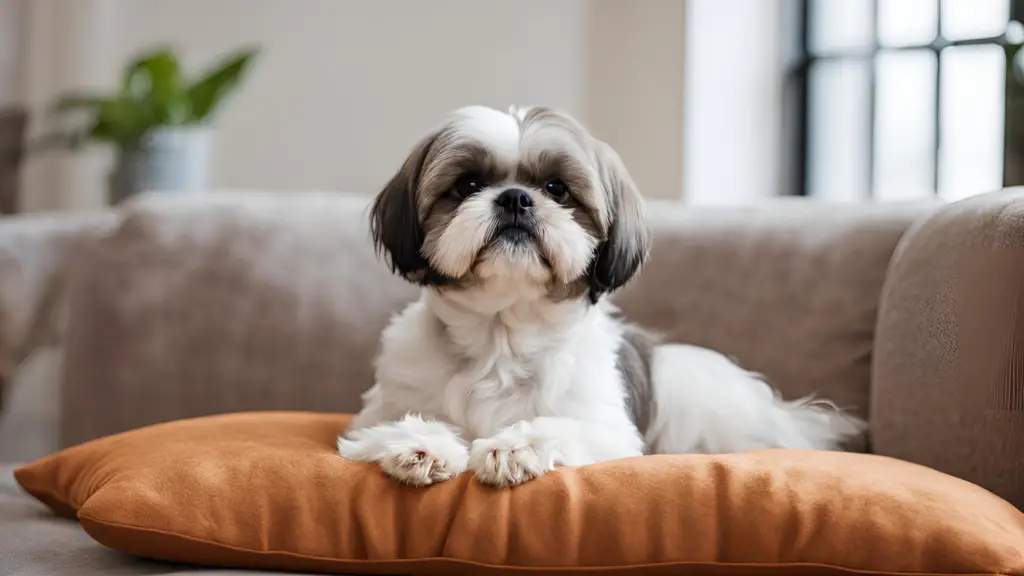
Make sure you have all the necessary supplies before your puppy arrives. This includes a crate, bedding, food and water bowls, puppy food, toys, grooming supplies, and training pads. Choosing the right food for your Shih Tzu puppy is also crucial. Look for high-quality puppy food that is specially formulated for small breeds. Proper nutrition is essential for your puppy’s growth and development.
Finally, plan the introduction of your new puppy to any other pets you have at home. The first meeting should be calm and supervised to ensure a positive interaction. Consider your puppy’s first night at home and how you will handle it. It’s likely that your puppy will feel a bit anxious or lonely, so having a comforting space prepared will make this transition easier.
The Importance of Establishing a Routine
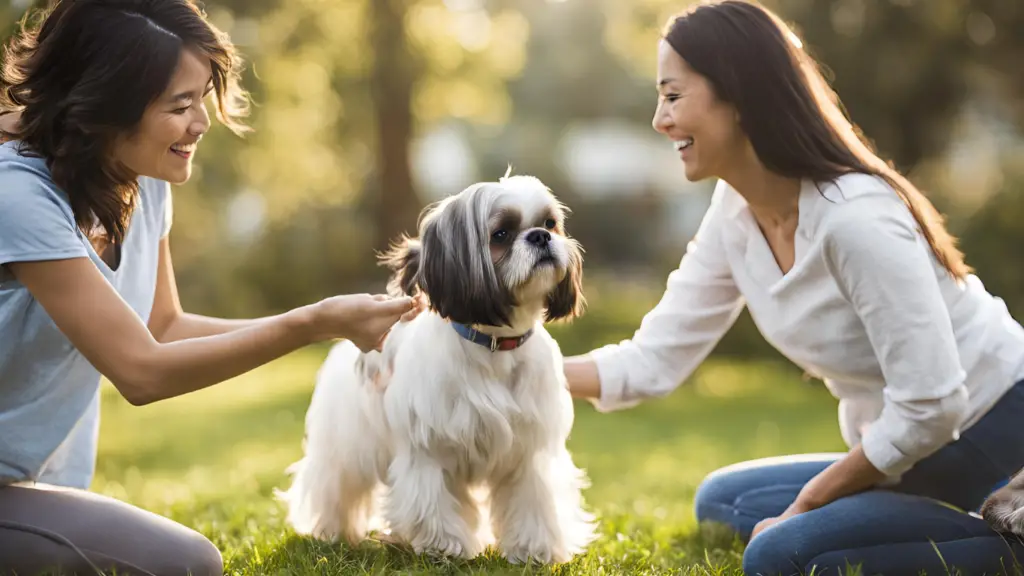
One of the most important things you can do during the first week with your Shih Tzu puppy is to establish a routine. Consistency is key when it comes to training and helping your puppy adapt to their new environment. Establishing a daily routine will help your puppy feel secure and understand what is expected of them.
Start with a feeding schedule. Shih Tzu puppies should be fed small meals three to four times a day. Stick to the same times each day to help regulate your puppy’s digestion and prevent any accidents in the house. Consistent meal times also make it easier to establish a bathroom routine.
Potty training should begin immediately. Take your puppy outside frequently, especially after meals, naps, and playtime. Use positive reinforcement by praising and rewarding your puppy when they go to the bathroom outside. It’s important to be patient, as accidents will happen, but consistency will pay off in the long run.
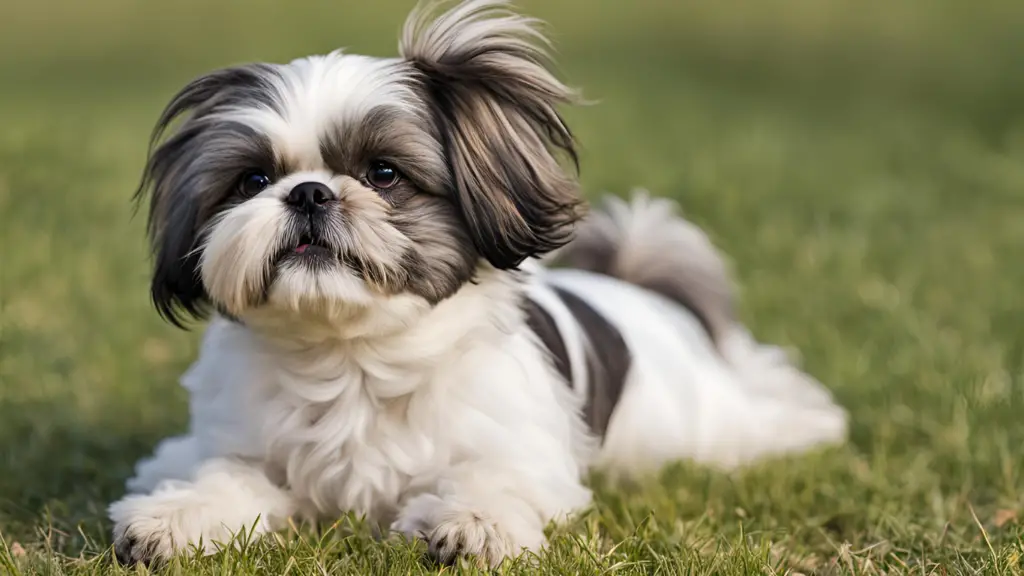
A sleep schedule is also crucial. Shih Tzu puppies need a lot of sleep, so make sure they have a quiet, comfortable place to rest. Avoid disturbing your puppy when they are sleeping, as proper rest is essential for their growth and well-being. Over time, your puppy will start to adjust to the rhythm of your household and develop a natural sleep routine.
Incorporate playtime and exercise into your puppy’s daily routine. Shih Tzus are playful dogs that enjoy spending time with their owners. Playtime helps burn off energy, promotes bonding, and prevents boredom. However, keep exercise sessions short and gentle, as Shih Tzu puppies have delicate bones and joints.
Finally, establish a training routine from the start. Shih Tzus are intelligent dogs, but they can be stubborn at times. Begin with basic commands such as sit, stay, and come. Use positive reinforcement techniques, such as treats and praise, to encourage good behavior. Training sessions should be short and consistent, as this will help your puppy retain what they learn.
The First Day Home: What to Expect

The first day with your Shih Tzu puppy is both exciting and overwhelming. Your puppy will be adjusting to a new environment, and it’s important to make this transition as smooth as possible. Expect your puppy to feel anxious or scared on the first day. This is normal, as they have just been separated from their mother and littermates. Be patient and gentle as your puppy explores their new surroundings.
Introduce your puppy to their designated space as soon as you bring them home. Show them where their bed, food, and water bowls are located. Allow them to explore their new environment at their own pace, and avoid overwhelming them with too much attention right away.
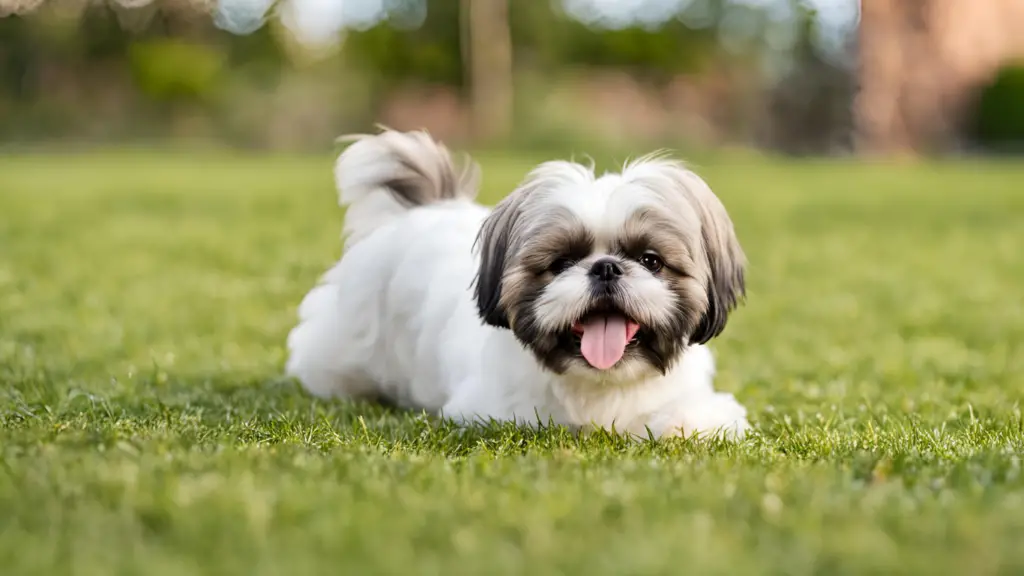
Establish a routine from the moment your puppy arrives. Take them outside to go to the bathroom, and begin feeding them at the scheduled times. This will help your puppy start to understand the structure of their new life and reduce any anxiety they may be feeling.
Keep in mind that your puppy may not eat much on the first day. This is normal and usually due to the stress of the move. Offer food at regular intervals, but don’t force your puppy to eat. Make sure they have access to fresh water at all times.
Socialization should begin on the first day, but take it slow. Allow your puppy to meet the other members of your household, including any pets, but supervise all interactions closely. Gradually introduce your puppy to new people, sounds, and experiences over the next few days to help them adjust.
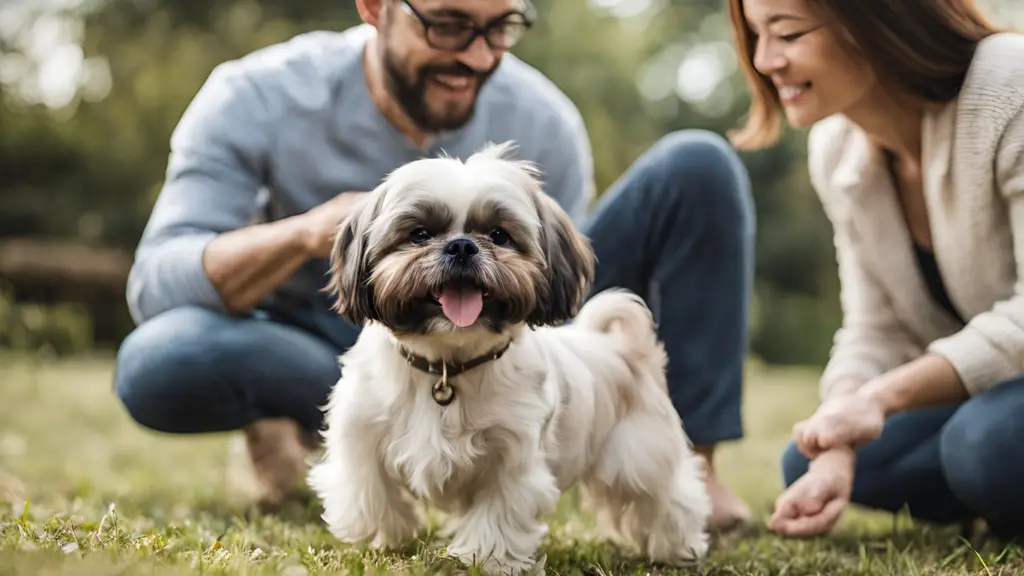
Finally, be prepared for a sleepless first night. It’s common for puppies to cry or whine during their first night in a new home. Place your puppy’s bed or crate near your own bed, so they can feel your presence. Reassure them with a calm voice, but avoid picking them up or giving too much attention, as this can reinforce the behavior.
Feeding Your Shih Tzu Puppy
Proper nutrition is essential for your Shih Tzu puppy’s growth and development. Choosing the right food is the first step. Look for high-quality puppy food that is specially formulated for small breeds. Shih Tzus have small stomachs, so they need nutrient-dense food that provides all the necessary vitamins and minerals.
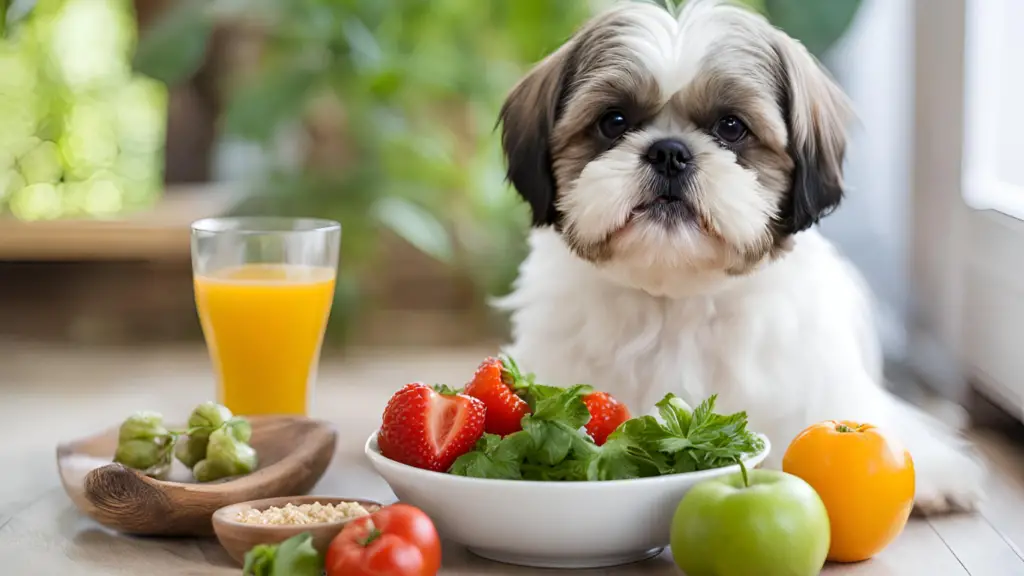
Feeding schedule is crucial for maintaining your puppy’s health. Shih Tzu puppies should be fed three to four small meals a day. Consistent meal times help regulate your puppy’s digestion and prevent hypoglycemia, a condition that small breed puppies are prone to if they go too long without eating.
Portion control is important to prevent overfeeding. Follow the feeding guidelines on the puppy food packaging, but also pay attention to your puppy’s body condition. Adjust the portions as needed to maintain a healthy weight. Overfeeding can lead to obesity, which can cause health problems later in life.
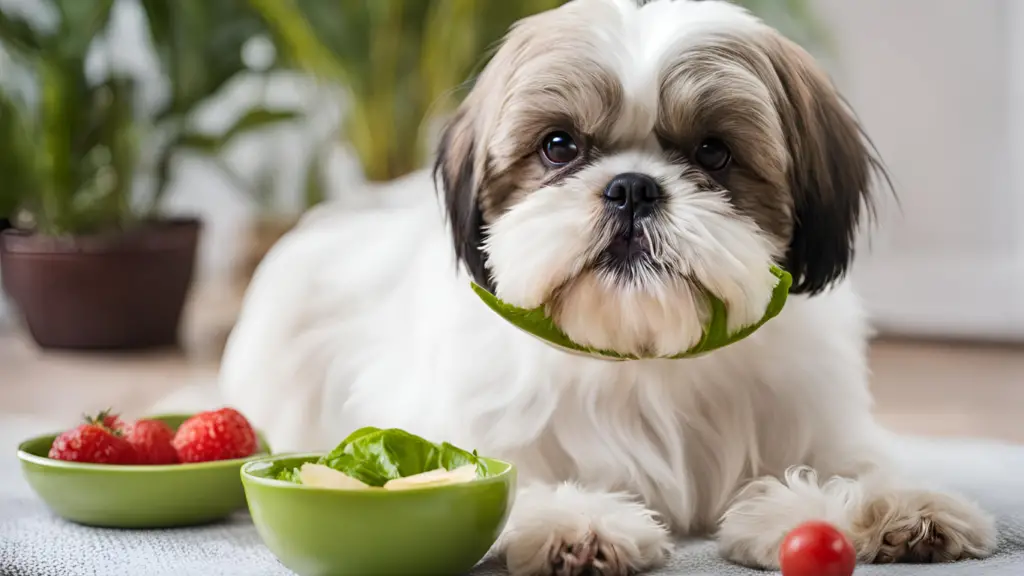
Treats are a great way to reward your puppy during training, but they should be given in moderation. Choose healthy, low-calorie treats, and limit them to no more than 10% of your puppy’s daily caloric intake. Too many treats can contribute to weight gain and upset your puppy’s balanced diet.
Hydration is just as important as feeding. Make sure your Shih Tzu has access to fresh, clean water at all times. Proper hydration supports digestion, helps regulate body temperature, and keeps your puppy’s coat and skin healthy.
Dietary changes should be made gradually to avoid digestive upset. If you need to change your puppy’s food, introduce the new food slowly by mixing it with the old food over several days until your puppy is fully transitioned. This helps prevent stomach issues and allows your puppy to adjust to the new diet.
House Training: Getting Started
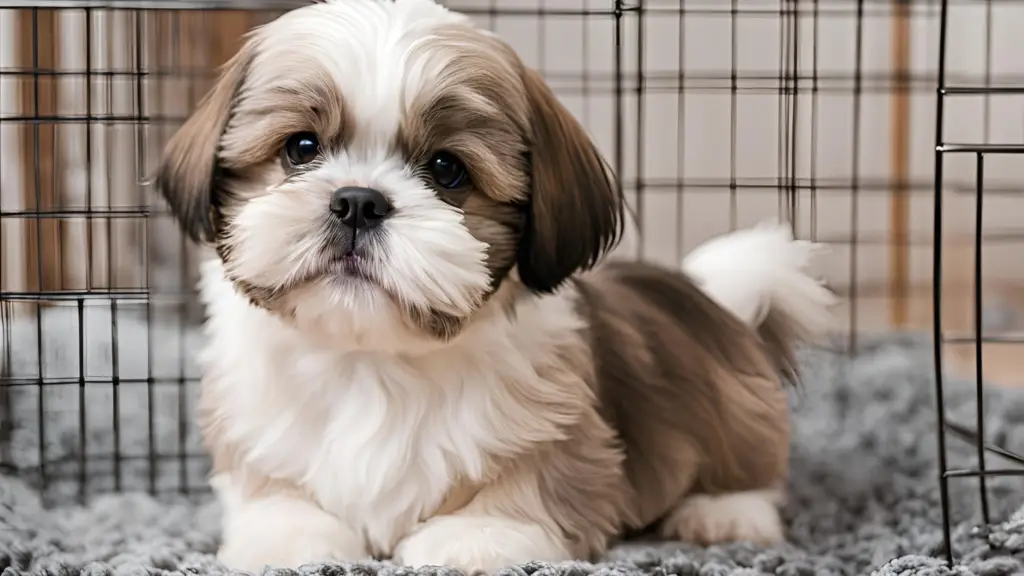
House training is one of the first and most important lessons you will teach your Shih Tzu puppy. Starting early is key to success. Begin house training as soon as you bring your puppy home, and be consistent with your approach. Shih Tzus are intelligent dogs, but they can be stubborn, so patience and persistence are essential.
Designate a potty area outside and take your puppy there regularly, especially after meals, naps, and playtime. Use a command like “go potty” to signal what you want your puppy to do, and reward them with praise and a treat when they go to the bathroom outside.

Supervision is crucial during the house training process. Keep a close eye on your puppy when they are indoors, and look for signs that they need to go to the bathroom, such as sniffing around or circling. If you catch your puppy in the act of going inside, gently interrupt them and take them outside immediately.
Consistency is key to house training success. Take your puppy outside at the same times every day, and use the same potty area each time. Over time, your puppy will learn to associate the potty area with going to the bathroom and will start to signal when they need to go outside.
Accidents will happen, especially during the first week. It’s important not to punish your puppy for accidents, as this can create fear and anxiety around house training. Instead, clean up the mess thoroughly with an enzyme cleaner to remove any lingering odor that might attract your puppy back to the same spot.
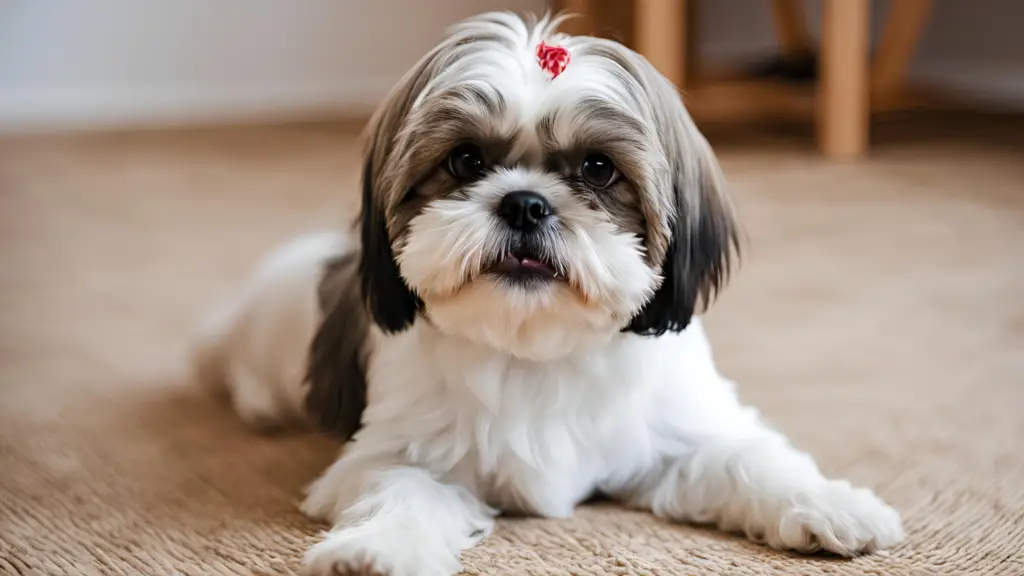
Crate training can be a helpful tool in house training. Puppies are less likely to go to the bathroom in their sleeping area, so using a crate can encourage your puppy to hold it until they are let outside. Make sure the crate is the right size, allowing your puppy to stand up, turn around, and lie down comfortably.
Gradual freedom should be given as your puppy becomes more reliable with house training. Start by allowing your puppy access to one room at a time, and gradually increase their freedom as they prove themselves trustworthy. This will help prevent accidents and reinforce good habits.
The First Night: Making It Comfortable
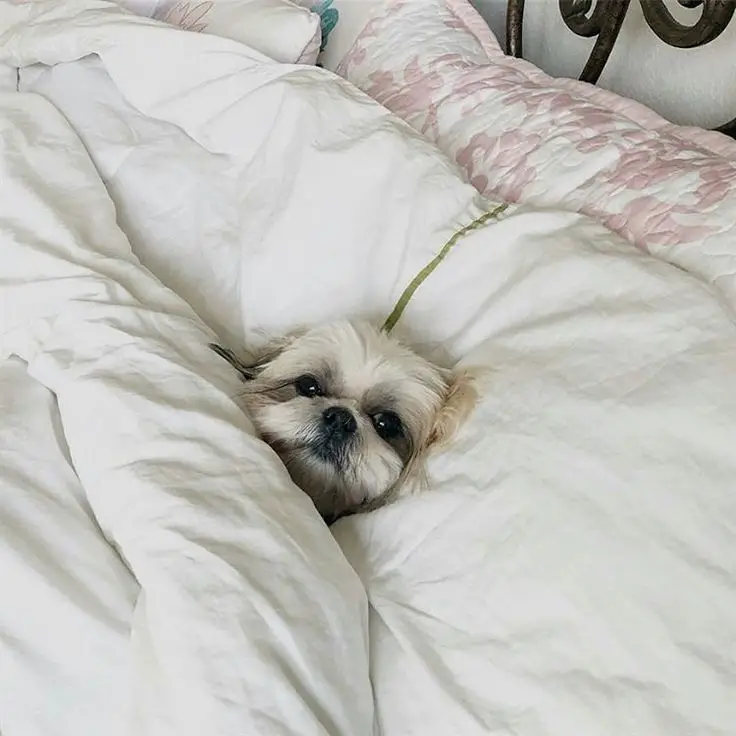
The first night home is a big adjustment for your Shih Tzu puppy. Expect some anxiety as your puppy is separated from their mother and littermates for the first time. It’s natural for them to feel scared or lonely, and it’s important to make the first night as comfortable as possible.
Setting up a cozy sleeping area is the first step. Place your puppy’s bed or crate in a quiet area of the house, away from any drafts or loud noises. A soft blanket or piece of clothing with your scent on it can provide comfort and help your puppy feel more secure.
Using a crate can help your puppy feel safe and secure during their first night. If you’re using a crate, place it next to your bed so your puppy can hear and smell you. This will provide reassurance and help reduce any anxiety your puppy may be feeling.
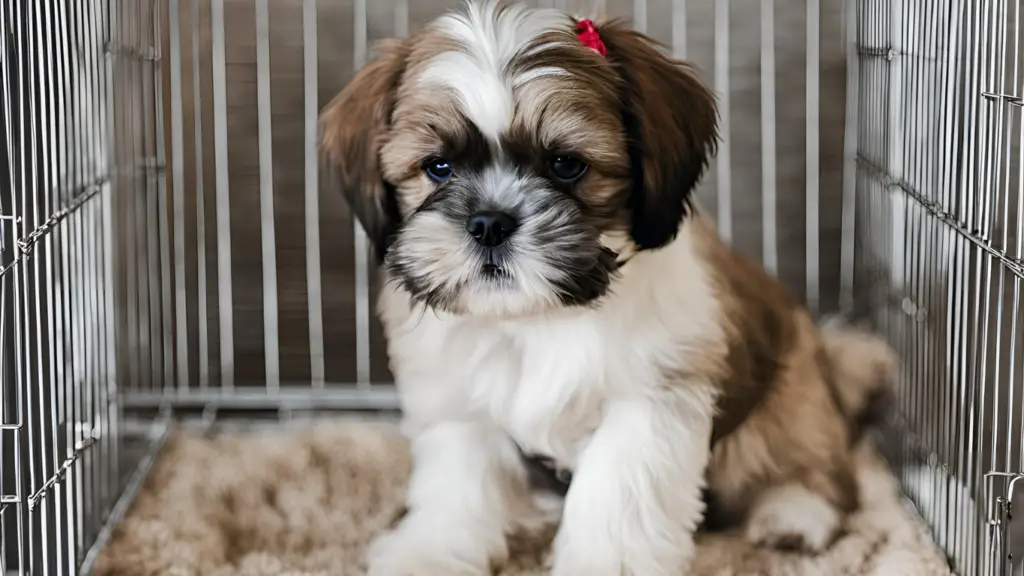
Comfort items, such as a soft toy or a ticking clock wrapped in a blanket, can mimic the heartbeat of your puppy’s mother and help them feel more at ease. These items can be placed in your puppy’s bed or crate to provide additional comfort.
Managing nighttime potty breaks is important during the first few nights. Your puppy’s bladder is still small, so they may need to go outside during the night. Set an alarm to take your puppy outside at regular intervals to prevent accidents and reinforce house training.
Avoiding too much attention is crucial when your puppy cries or whines during the night. While it’s important to reassure your puppy, too much attention can reinforce the behavior and make it harder for your puppy to settle down. Instead, calmly soothe your puppy with your voice and try to ignore the whining as much as possible.
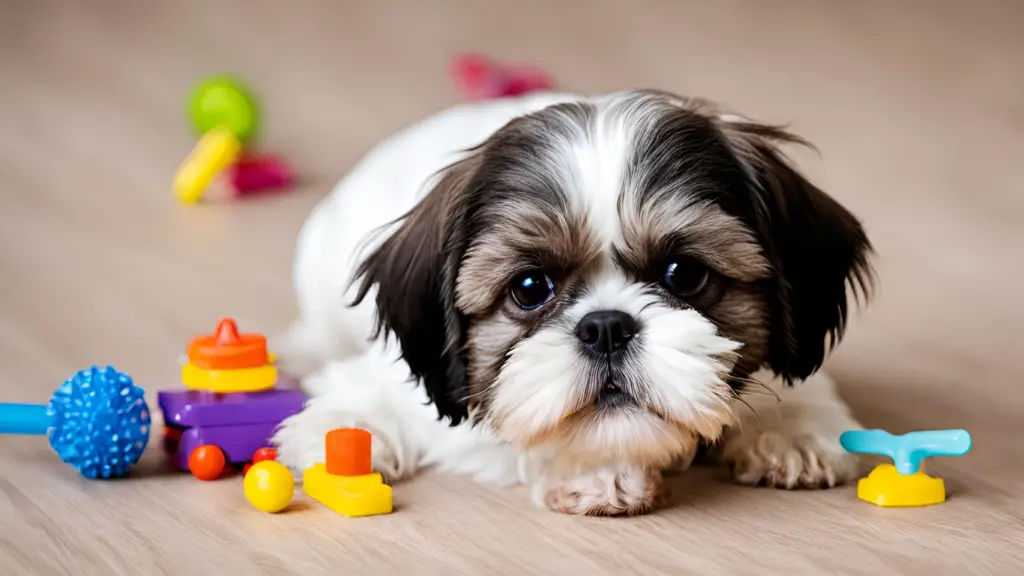
Patience and consistency are key to getting through the first night. It’s normal for your puppy to be restless or wake up frequently, but with time and patience, they will start to adjust to their new home and develop a sleep routine.
Introducing Your Puppy to the Family
Introducing your Shih Tzu puppy to your family is an exciting moment, but it’s important to do it right to ensure a smooth transition. Start with a calm introduction. When you bring your puppy home, keep the initial meeting low-key and quiet. Allow your puppy to approach each family member at their own pace, and avoid overwhelming them with too much attention at once.
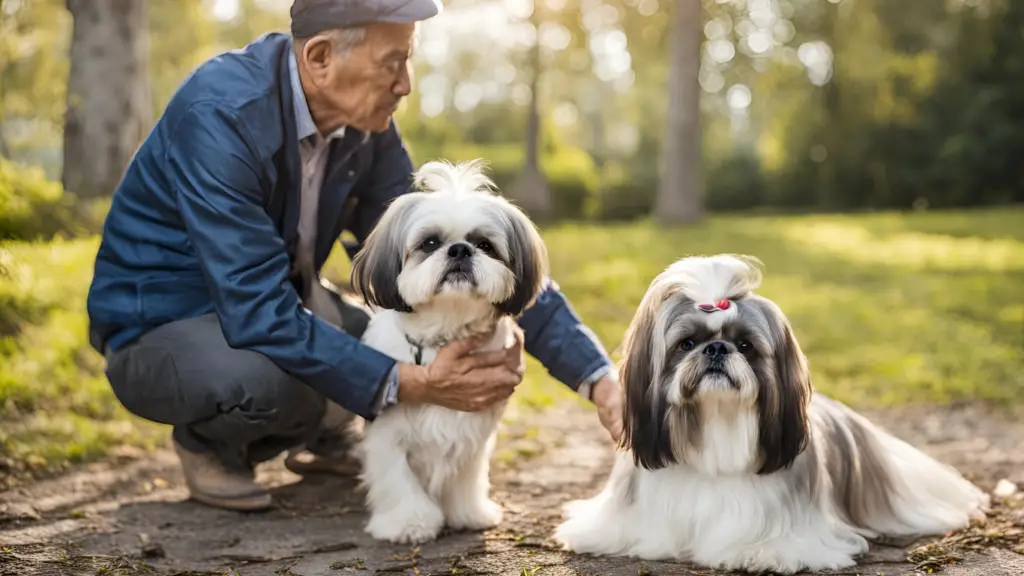
Teaching children how to interact with the puppy is crucial. Shih Tzu puppies are small and delicate, so it’s important for children to understand how to handle them gently. Supervise all interactions between your puppy and young children to ensure that both are safe and comfortable.
Introducing your puppy to other pets in the household should be done gradually. Allow your pets to sniff and observe the new puppy from a distance before allowing closer interaction. Be patient and take your time with this process to prevent any potential conflicts or stress for either the puppy or the existing pets.
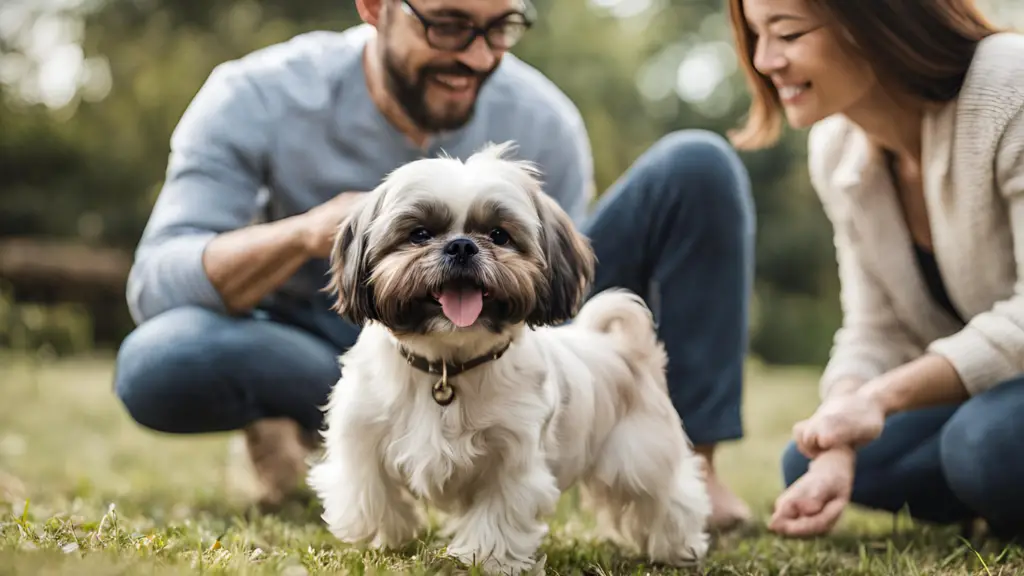
Creating positive associations is important during the introduction process. Give treats and praise to both your puppy and other pets when they are calm and well-behaved around each other. This will help create positive associations and foster a harmonious relationship between all members of the household.
Supervised interactions are key in the early days. Even if your pets seem to get along well with the new puppy, it’s important to supervise all interactions closely. Puppies can be playful and energetic, which might be overwhelming for older pets. Supervision will help prevent any accidental injuries or negative experiences.
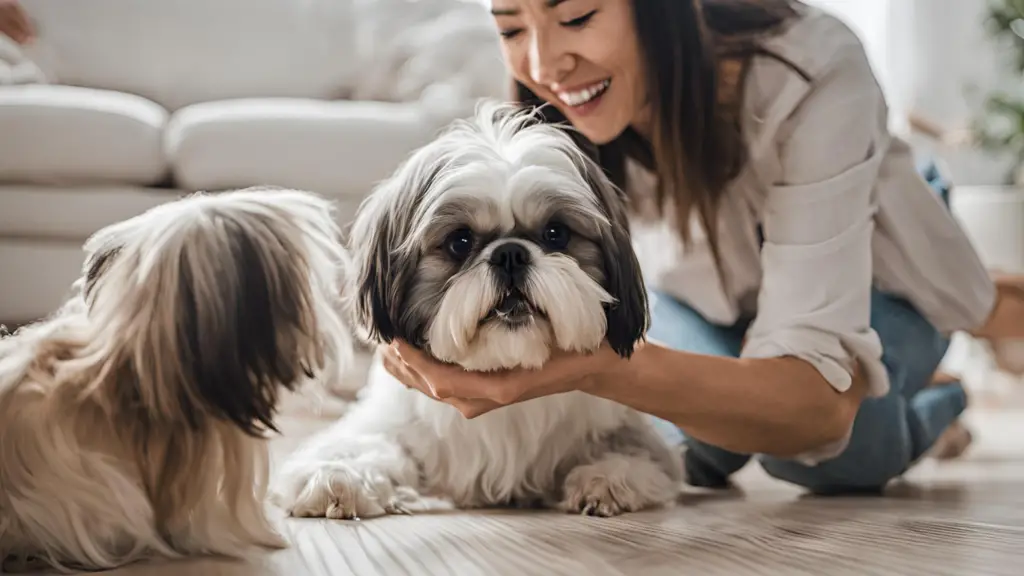
Establishing boundaries is also important. Make sure each pet in the household has their own space where they can retreat if they need some time alone. This will help reduce any stress or tension and ensure that all pets feel safe and secure in their environment.
Gradually increasing interaction over time is the best approach. As your puppy and other pets become more comfortable with each other, you can allow them to spend more time together. However, continue to monitor their interactions and be prepared to step in if needed.
Socialization: The Key to a Well-Adjusted Puppy

Socialization is a critical aspect of your Shih Tzu puppy’s development. Early socialization helps prevent behavior problems and ensures that your puppy grows up to be a confident and well-adjusted dog. Start socializing your puppy as soon as they come home, introducing them to a variety of people, places, and experiences.
Introducing your puppy to new people is an important part of socialization. Invite friends and family members to meet your puppy, and expose them to people of different ages, sizes, and appearances. This will help your puppy become comfortable around different types of people and reduce the likelihood of fear-based behaviors.
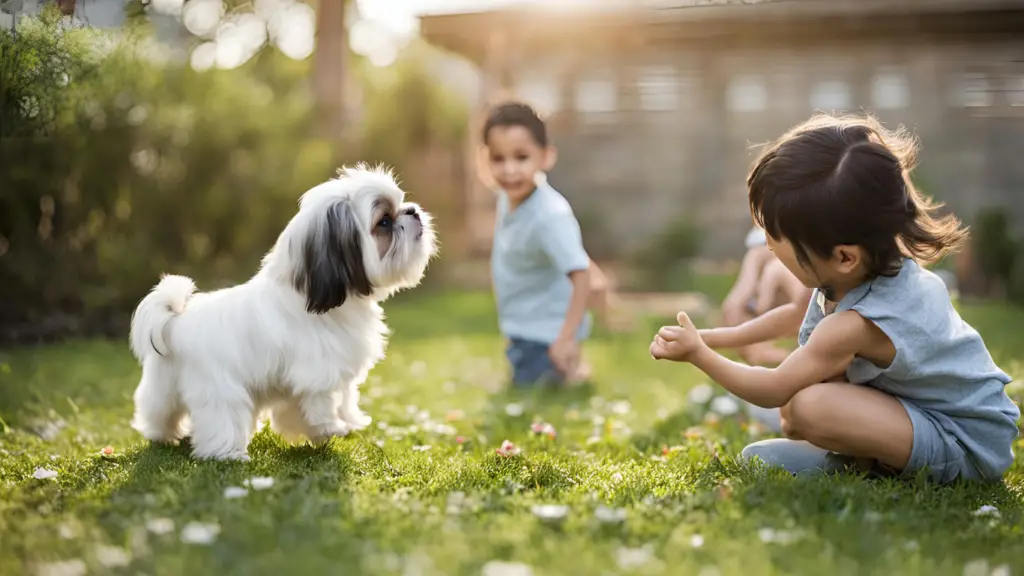
Exposing your puppy to different environments is also crucial. Take your puppy on short trips to different places, such as parks, pet-friendly stores, and busy streets. This will help them become accustomed to different sights, sounds, and smells, and prevent them from becoming fearful or anxious in new situations.
Socializing with other dogs is important for your puppy’s development. Arrange playdates with other friendly, vaccinated dogs to help your puppy learn how to interact with other dogs. Supervise all interactions and ensure that they are positive experiences for your puppy.
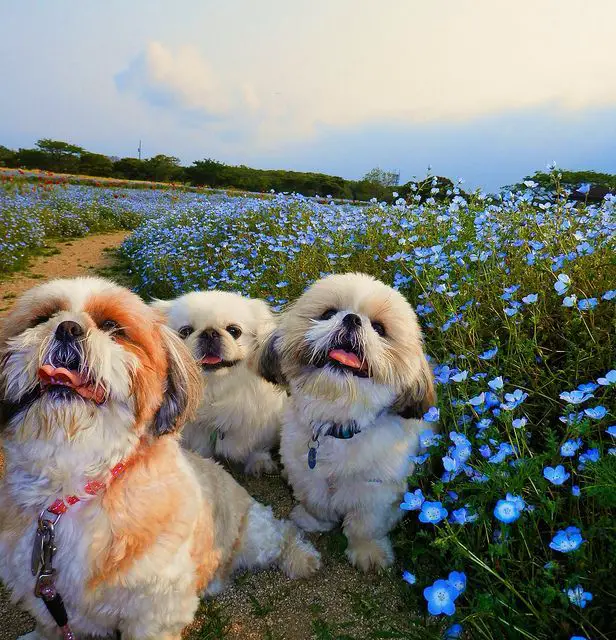
Positive reinforcement is key during the socialization process. Reward your puppy with treats, praise, and playtime when they respond well to new experiences. This will help reinforce good behavior and build your puppy’s confidence.
Gradual exposure is important when socializing your puppy. Introduce new experiences slowly and at your puppy’s own pace. Forcing your puppy into situations they are not comfortable with can lead to fear and anxiety. Instead, allow your puppy to explore new things on their own terms.
Handling and grooming should be part of your puppy’s socialization. Gently handle your puppy’s paws, ears, and mouth regularly to get them used to being touched. This will make grooming and veterinary visits less stressful for your puppy as they grow older.
Ongoing socialization is essential throughout your puppy’s first year of life. Continue to expose your puppy to new experiences, people, and places on a regular basis to reinforce their socialization and prevent any behavior problems from developing.
Training Basics: Setting the Groundwork
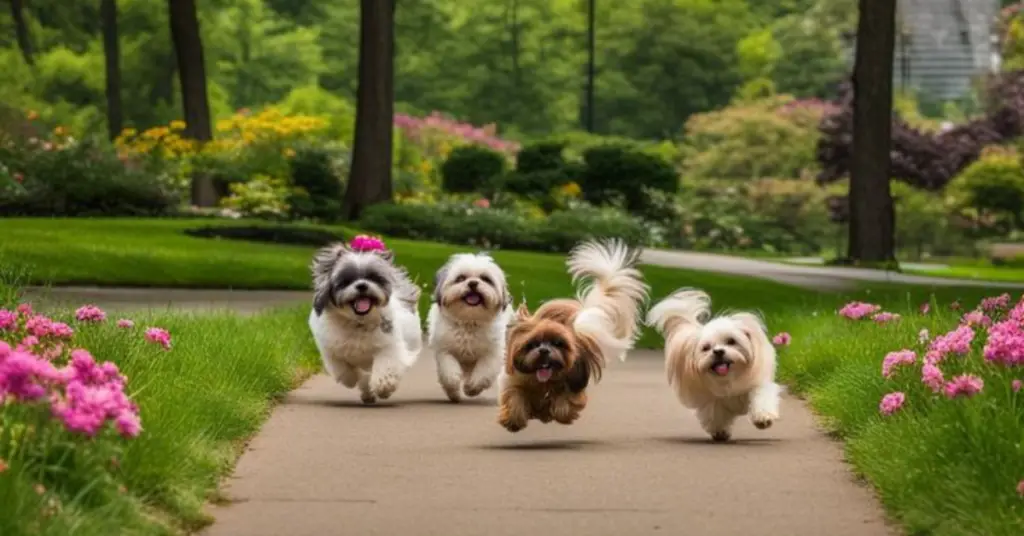
Training is an essential part of raising a well-behaved Shih Tzu puppy. Start with basic commands as soon as your puppy comes home. Commands such as sit, stay, and come are the foundation of good behavior and will help you communicate with your puppy effectively.
Positive reinforcement is the most effective training method for Shih Tzus. Reward your puppy with treats, praise, and playtime when they follow commands or display good behavior. Positive reinforcement encourages your puppy to repeat the behavior and helps build a strong bond between you and your puppy.

Consistency is key when it comes to training. Use the same commands and hand signals each time you train your puppy. Consistency helps your puppy understand what is expected of them and speeds up the learning process.
Short training sessions are best for young puppies. Keep training sessions to about 5-10 minutes, and repeat them several times a day. Puppies have short attention spans, so short, frequent sessions are more effective than longer ones.
Patience is essential during the training process. Shih Tzus can be stubborn at times, so it’s important to be patient and persistent. Avoid getting frustrated or using harsh methods, as this can damage your relationship with your puppy and make training more difficult.

Socialization as part of training is also important. Use training opportunities to expose your puppy to new experiences and environments. For example, practice commands in different locations, such as the park or a friend’s house. This will help your puppy learn to follow commands in different situations.
Advanced training and socialization should be introduced as your puppy grows. Once your puppy has mastered the basics, you can move on to more advanced training, such as leash walking, recall, and tricks. Continue to expose your puppy to new experiences and environments to reinforce their socialization.
The First Vet Visit
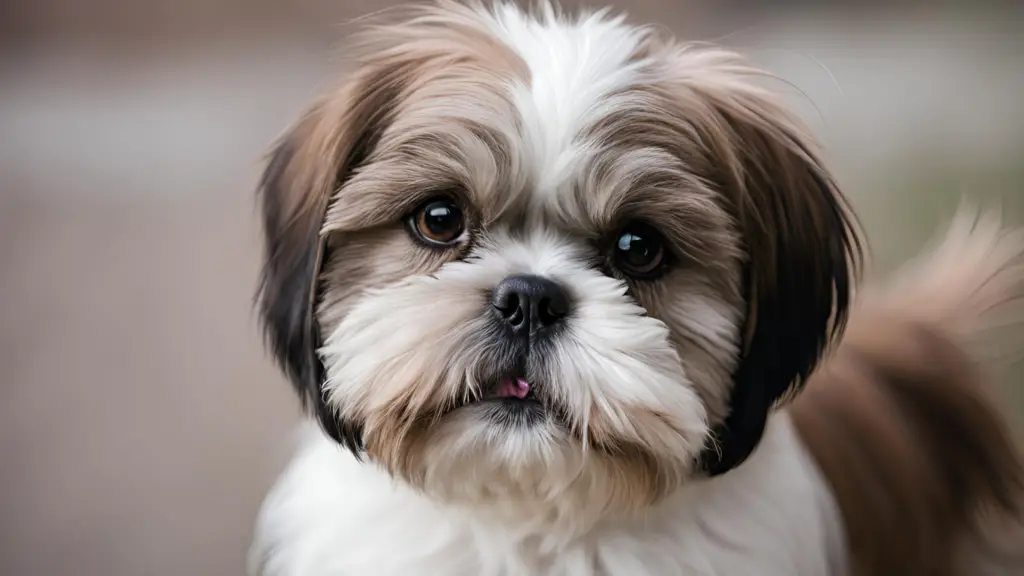
The first vet visit is a crucial step in your Shih Tzu puppy’s care. Schedule the first visit within a few days of bringing your puppy home. This will allow the vet to check your puppy’s health and ensure they are up to date on vaccinations.
Choosing the right vet is important. Look for a vet who is experienced with small breeds and has a good reputation in your community. A vet who is familiar with the specific health needs of Shih Tzus can provide the best care for your puppy.
What to expect during the first vet visit includes a thorough physical examination, vaccinations, and a discussion of your puppy’s overall health. The vet will check your puppy’s eyes, ears, teeth, and coat, as well as listen to their heart and lungs. They will also check for any signs of illness or congenital conditions.

Vaccinations and preventive care are essential for your puppy’s health. The vet will administer the necessary vaccinations to protect your puppy from common diseases, such as parvovirus and distemper. They may also discuss preventive care options, such as flea and tick prevention and heartworm medication.
Discussing diet and nutrition with your vet is important. The vet can provide guidance on the best food for your Shih Tzu puppy and recommend portion sizes based on your puppy’s age and weight. They can also address any dietary concerns you may have.

Addressing any concerns or questions you have about your puppy’s health is important during the first vet visit. Don’t hesitate to ask the vet about anything that is on your mind, whether it’s about behavior, feeding, or general care. The vet is there to help and provide you with the information you need to care for your puppy.
Planning for future visits is important to ensure your puppy’s ongoing health. The vet will likely schedule follow-up visits for additional vaccinations and check-ups. Regular vet visits are essential for keeping your puppy healthy and catching any potential health issues early.
Feeding Your Shih Tzu Puppy: Nutrition Essentials
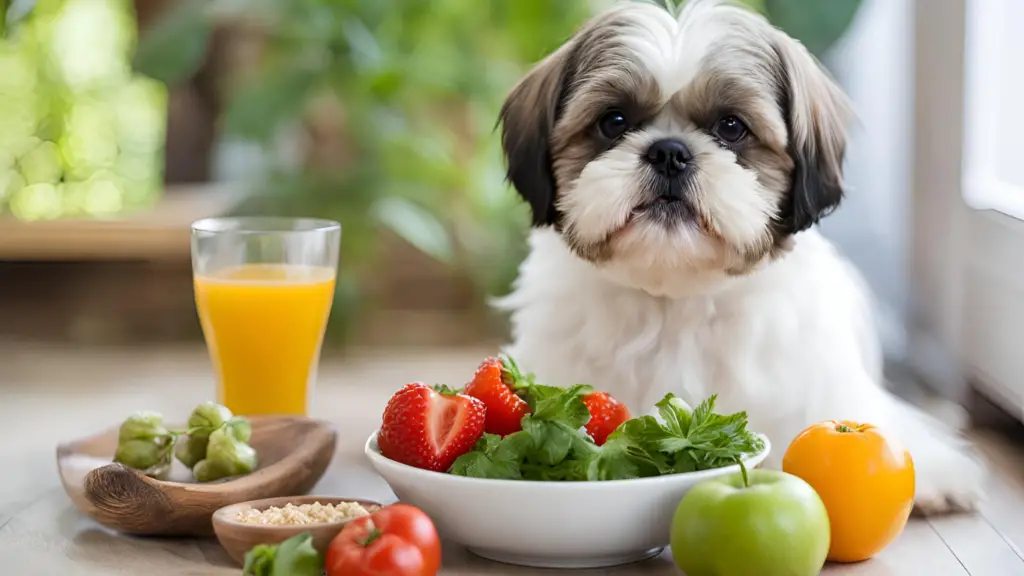
Feeding your Shih Tzu puppy the right diet is essential for their growth and development. Choosing the right food is the first step. Look for a high-quality puppy food that is specifically formulated for small breeds. Small breed puppy food is designed to meet the unique nutritional needs of small dogs, including the right balance of protein, fat, and carbohydrates.
Establishing a feeding schedule is important for your puppy’s digestion and overall health. Shih Tzu puppies should be fed three to four small meals a day. As your puppy grows, you can gradually reduce the number of meals to two a day. Feeding your puppy at the same times each day helps regulate their digestion and prevents overeating.
Portion control is essential to prevent obesity, which is a common issue in Shih Tzus. Follow the feeding guidelines on the puppy food packaging and adjust the portion size based on your puppy’s age, weight, and activity level. It’s important to monitor your puppy’s weight and adjust their food intake as needed.
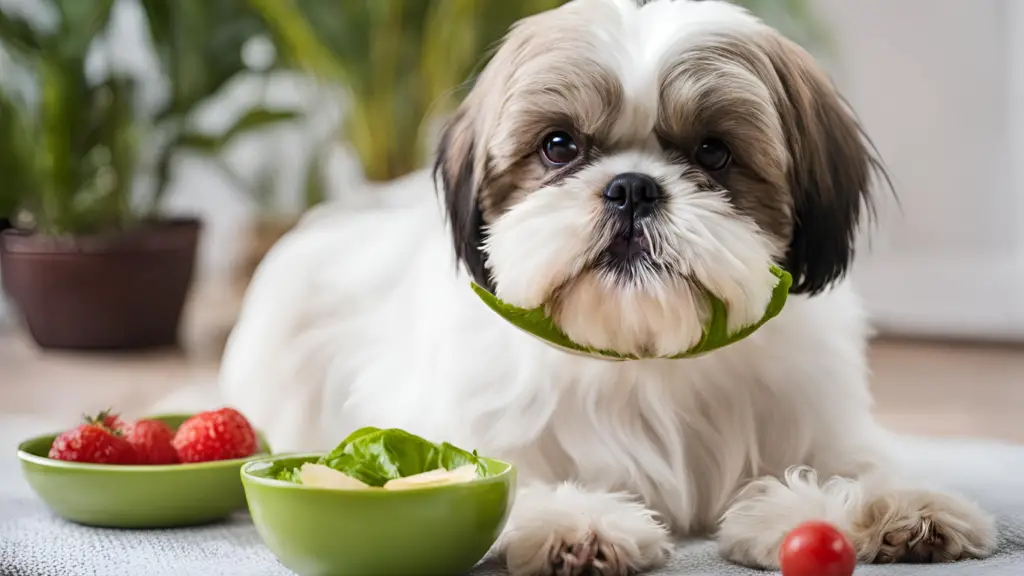
Providing fresh water at all times is crucial for your puppy’s health. Shih Tzus are prone to dehydration, especially in hot weather, so make sure your puppy always has access to clean, fresh water. Keep their water bowl filled and clean it regularly to prevent bacteria growth.
Introducing new foods should be done gradually. If you need to switch your puppy’s food, do it slowly over a period of 7-10 days to avoid upsetting their stomach. Start by mixing a small amount of the new food with the old food and gradually increase the amount of new food each day.
Avoiding table scraps and human food is important for your puppy’s health. Many human foods can be harmful to dogs, and feeding table scraps can lead to obesity and other health issues. Stick to a balanced puppy diet and use dog-specific treats for training and rewards.

Monitoring your puppy’s growth and development is essential to ensure they are getting the right nutrition. Regular vet visits and weighing your puppy at home can help you keep track of their growth. If you have any concerns about your puppy’s diet or growth, consult your vet for advice.
House Training: Patience and Persistence
House training your Shih Tzu puppy is one of the most important tasks during the first week. Establishing a routine is key to successful house training. Take your puppy outside to the same spot at the same times each day, such as after meals, playtime, and naps. Puppies thrive on routine, and establishing a consistent schedule will help them learn where and when to go potty.
Positive reinforcement is crucial during house training. When your puppy goes potty outside, reward them immediately with praise, treats, or playtime. Positive reinforcement helps your puppy understand that going potty outside is a good thing and encourages them to repeat the behavior.

Using a crate can be a helpful tool for house training. Dogs naturally avoid soiling their sleeping area, so a crate can help your puppy learn to hold their bladder until they are taken outside. Make sure the crate is just big enough for your puppy to stand up, turn around, and lie down comfortably. Too much space can lead to accidents in the crate.
Accidents will happen during the house training process, so it’s important to be patient and avoid punishment. If your puppy has an accident, clean it up immediately with an enzymatic cleaner to remove any lingering odor. Avoid scolding your puppy, as this can create fear and anxiety around house training.
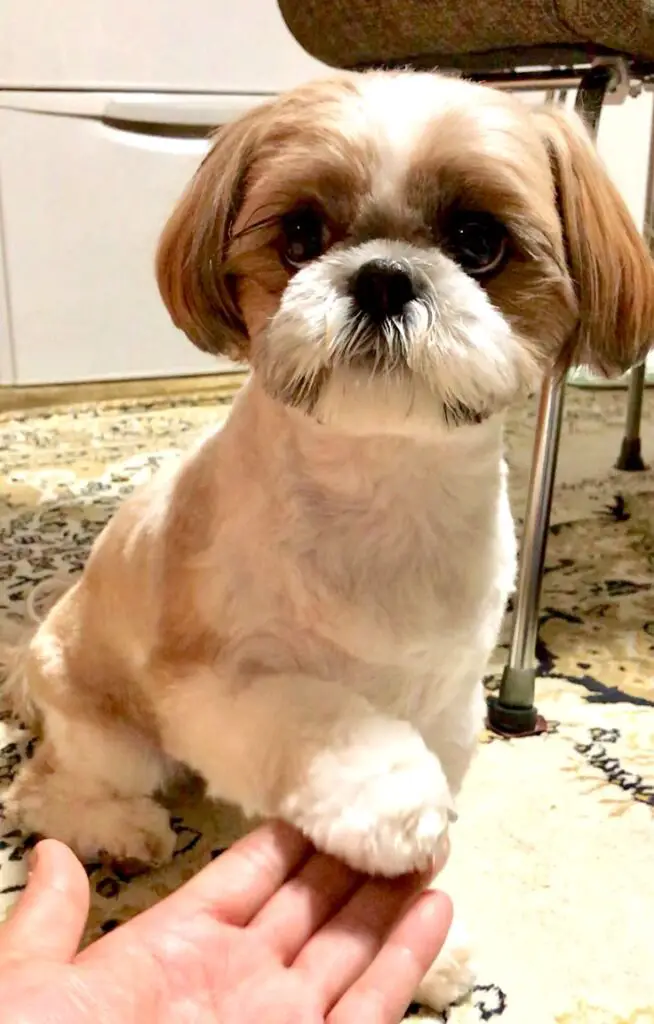
Supervision is key during house training. Keep a close eye on your puppy when they are not in their crate to prevent accidents. If you see signs that your puppy needs to go potty, such as sniffing the ground or circling, take them outside immediately.
Nighttime potty breaks may be necessary during the first few weeks. Your puppy’s bladder is still small, so they may need to go outside during the night. Set an alarm to take your puppy out at regular intervals to prevent accidents and reinforce house training.
Gradual freedom should be given as your puppy becomes more reliable with house training. Start by giving your puppy more access to the house as they become better at holding their bladder and going potty outside. Continue to supervise them closely and be prepared for occasional accidents as they learn.
Puppy-Proofing Your Home
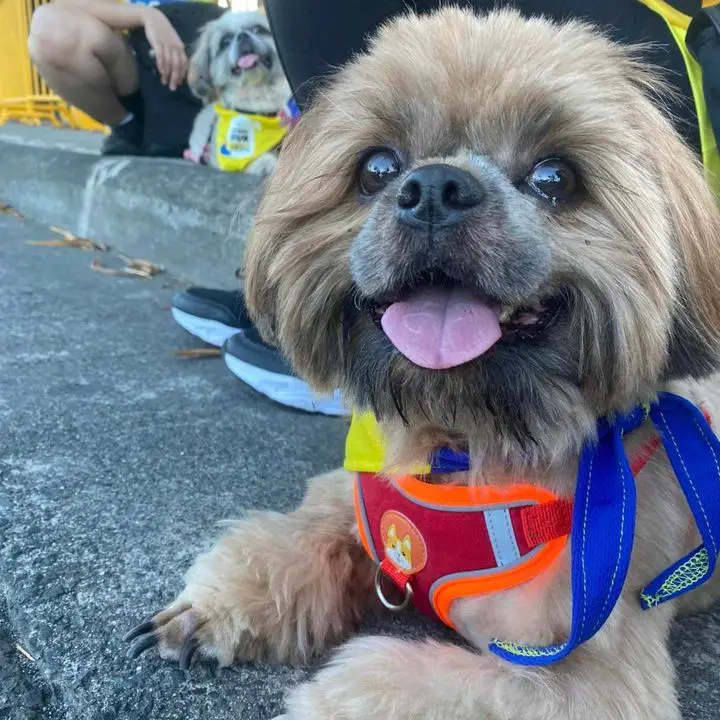
Puppy-proofing your home is essential to keep your Shih Tzu puppy safe and prevent damage to your belongings. Identifying potential hazards is the first step. Go through each room of your house and look for anything that could be dangerous to your puppy, such as electrical cords, small objects, and toxic plants. Remove or secure these items to prevent accidents.
Securing dangerous areas is important to keep your puppy safe. Use baby gates or closed doors to block off areas of the house that are not puppy-proofed. This includes rooms with valuable or dangerous items, such as the kitchen, bathroom, or home office.
Storing household chemicals and medications out of reach is crucial. Keep all cleaning products, medications, and other chemicals in high cabinets or secure them with childproof locks. Puppies are curious and may chew on bottles or containers, which can be dangerous.

Covering electrical cords is important to prevent your puppy from chewing on them. Use cord covers or hide cords behind furniture to keep them out of your puppy’s reach. Chewing on electrical cords can lead to serious injuries, including electric shock.
Providing safe toys is essential to keep your puppy entertained and prevent them from chewing on household items. Choose durable, puppy-safe toys that are appropriate for your puppy’s size and chewing habits. Avoid toys with small parts that could be swallowed or pose a choking hazard.

Setting up a designated play area is a good way to keep your puppy safe and contained. Use baby gates or a playpen to create a safe space where your puppy can play and explore without getting into trouble. Make sure the area is free of hazards and filled with safe toys and bedding.
Supervising your puppy is the best way to keep them safe and prevent accidents. Even with a puppy-proofed home, it’s important to keep an eye on your puppy at all times. Supervision allows you to intervene if your puppy gets into something they shouldn’t and helps prevent accidents before they happen.
Building a Bond with Your Shih Tzu Puppy
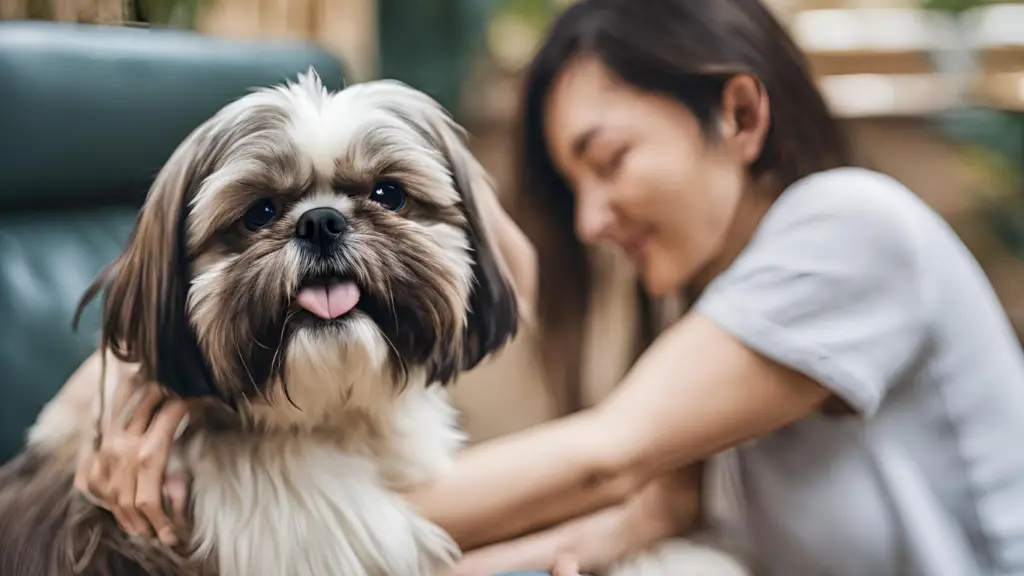
Building a strong bond with your Shih Tzu puppy is essential for a happy and healthy relationship. Spending quality time together is the foundation of building a bond. Set aside time each day to play, cuddle, and interact with your puppy. This will help you develop a strong connection and build trust with your new companion.
Training as a bonding activity is a great way to strengthen your relationship with your puppy. Use positive reinforcement techniques to teach your puppy basic commands and tricks. Training sessions are not only educational but also a fun way to bond with your puppy and build mutual respect.
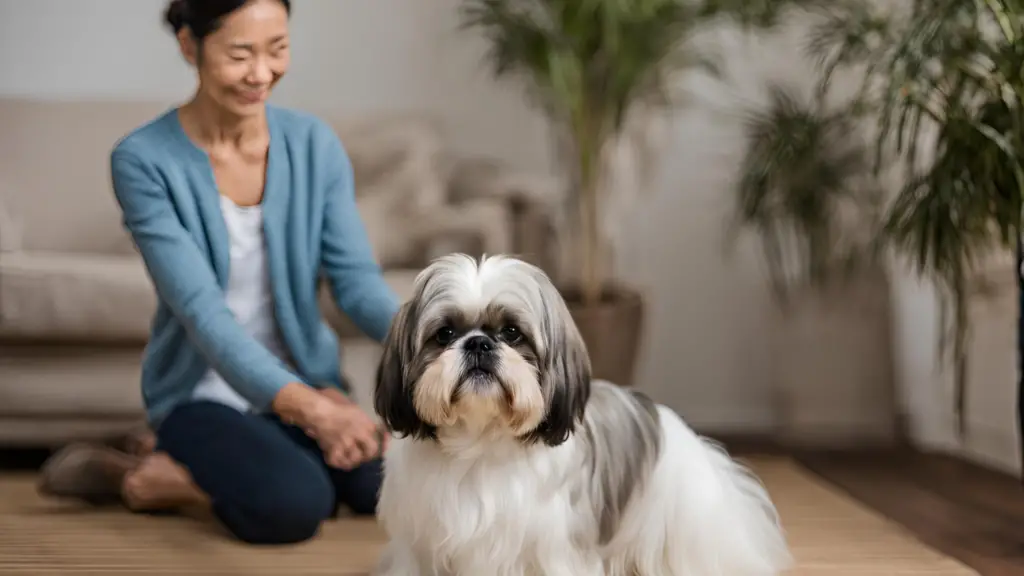
Grooming as a bonding experience is another way to strengthen your relationship with your puppy. Regular grooming sessions, including brushing, bathing, and nail trimming, help keep your puppy healthy and provide an opportunity for you to bond. Be gentle and patient during grooming to create a positive experience for your puppy.
Providing mental stimulation is important for your puppy’s development and helps build a strong bond. Engage your puppy in interactive play, such as puzzle toys or games of fetch, to challenge their mind and keep them entertained. Mental stimulation helps prevent boredom and strengthens your bond with your puppy.
Consistency and routine are key to building a bond with your puppy. Establishing a daily routine for feeding, playtime, and training helps your puppy feel secure and builds trust. Consistency in your interactions with your puppy also helps reinforce good behavior and strengthens your relationship.
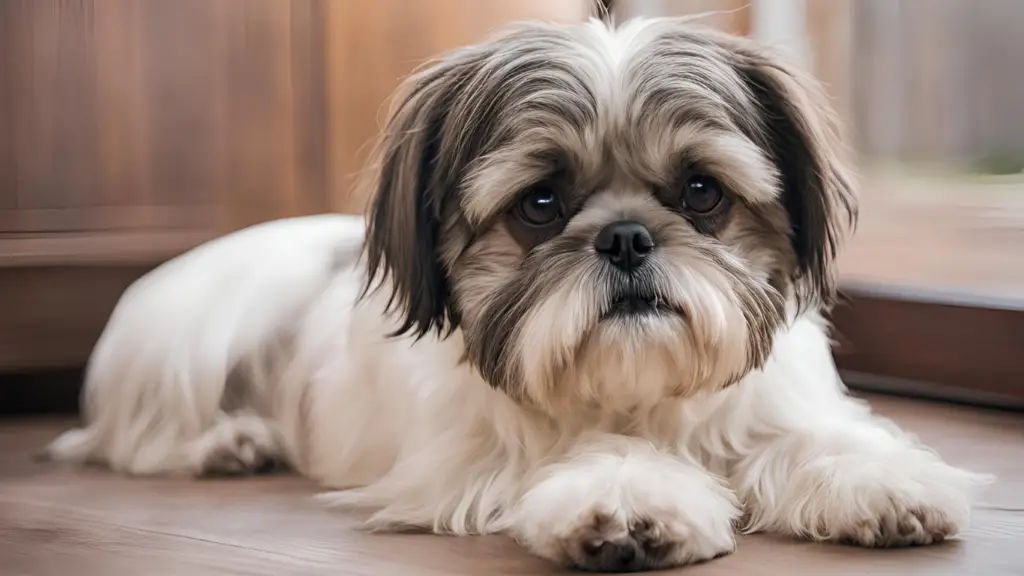
Positive reinforcement is essential for building a bond with your puppy. Reward your puppy with treats, praise, and affection when they display good behavior or respond well to training. Positive reinforcement helps build your puppy’s confidence and strengthens your bond.
Patience and understanding are important when building a bond with your puppy. Remember that your puppy is still learning and may make mistakes along the way. Be patient, understanding, and supportive as your puppy adjusts to their new home and learns the ropes.
Conclusion

The first week with your Shih Tzu puppy is an exciting and challenging time. Establishing a routine, providing a safe environment, and building a bond with your puppy are all essential steps in ensuring a smooth transition. With patience, consistency, and plenty of love, you can help your Shih Tzu puppy feel comfortable and secure in their new home.
As you embark on this journey with your new companion, remember that patience and persistence are key. Training, socialization, and housebreaking take time, but with dedication and positive reinforcement, your puppy will quickly learn the ropes.
Building a strong bond with your Shih Tzu is essential for a happy and fulfilling relationship. Spend quality time together, engage in training and grooming, and provide plenty of mental stimulation to create a deep connection with your puppy.
By following the tips and guidelines outlined in this guide, you can ensure that your first week with your Shih Tzu puppy is a positive and rewarding experience. With love, care, and attention, your Shih Tzu puppy will grow into a happy, healthy, and well-adjusted dog, and you will have a loyal and loving companion for years to come.


